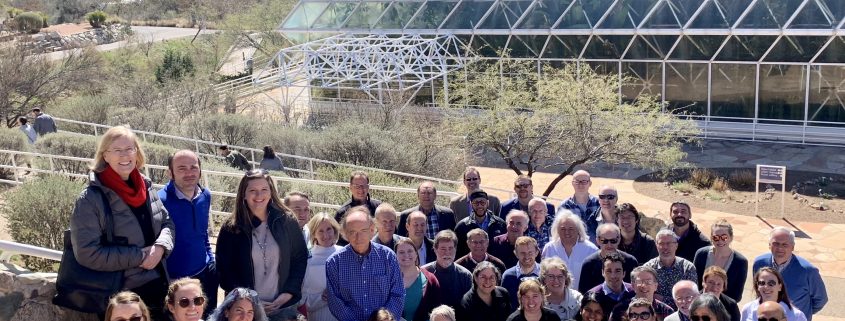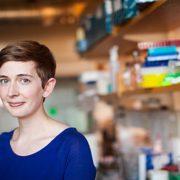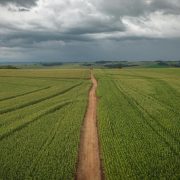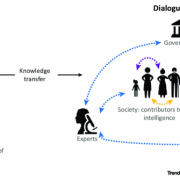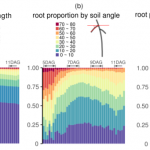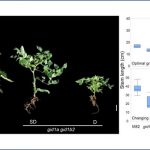Unite, Inspire, Enable: The future of plant science
Authors: JP Dundore-Arias, Jacque Fletcher, and Brett Tyler
This article originally appeared in Phytopathology News (May 2019, Volume 53, Issue 5)
“The goal of a sustainable future, with a more nimble and innovative workforce and a highly competitive research enterprise, is in the national interest…. The vision articulated here…will dramatically increase the ability of plant scientists to understand, predict, and alter plant behavior.” —Unleashing a Decade of Innovation in Plant Science 2013
Although the quote above appeared 6 years ago in the report that emerged from the first Plant Science Decadal Vision Summit (which occurred in two segments in 2011 and 2013), it remains highly relevant to the mission and goals of the second Plant Summit, held February 10–13, 2019, at the Biosphere 2 Conference and Retreat Center in Oracle, Arizona. This year’s event, organized by the Plant Science Research Network (PSRN), brought together 52 plant scientists representing a wide range of plant science subdisciplines (from botany, ecology, taxonomy, and genetics to agronomy, plant pathology, and soil science), organizational entities (professional societies, universities, industrial organizations, commodity groups, funding agencies, and others), perspectives (research, education and training, diversity and inclusion, science funding, and science communication), and career stages (students, post-docs, junior faculty, and senior faculty, including university administrators). The American Phytopathological Society (APS), one of several organizations that are part of the PSRN, was represented by members JP Dundore-Arias, Jacque Fletcher, and Brett Tyler. Objective and Goals The objective of the 2019 Plant Summit was to harness the wisdom, experience, creativity, diversity, and energy of a highly diverse group of plant scientists to develop a new, collective vision for reimagining plants and plant science in the future. Goals were to gather collective wisdom informing the future of plant science; to identify and prioritize strategic needs in research, education, outreach, and communication for the future; and to address grand challenges and grand opportunities for plant science.

Conference Themes and Discussion
Feverish, animated, facilitated small-group discussions tackled topics such as developing multi- and interdisciplinary collaborations in science; elevating visibility of the role of plants to the public, policy makers, and funders; ensuring an equitable, diverse, and inclusive plant science environment; understanding plants and plant communities as systems (phytobiomes); integrating plant systems across scales (genes-cells-tissues plants-landscapes-environments-timeframes); making the most of the global nature of plant science; identifying the potential of new technologies transforming plant science, and translating those capabilities to the real world; and exploring new frontiers in plant science. including plants for human health, plants as sensors, and plants in space. A pervasive theme was how to harness plant systems science to feed 10 billion people by 2050 while preserving and enhancing the natural environment on a global scale.
Conference Outcomes and Follow-On Activities
Brainstorming from early morning to late at night with colleagues proved synergistic and productive. Major plant science research themes and subthemes (water issues, carbon balance, planetary resilience, plants for human health, data management and mining, public national resources) emerged and are being coalesced by a core writing team charged to develop a first draft of the next Plant Science Decadal Vision (2020–2030). All summit participants will have the opportunity to review the draft and make suggestions before its publication.
Some General Concluding Thoughts from the APS Reps
The 2019 Plant Summit was a unique and valuable experience because of (1) the unusually rich diversity of disciplines, perspectives, institutions, and career stages represented; (2) the challenge of working together as a community to reach consensus in identifying and prioritizing multi- and cross-disciplinary goals for plant science; and (3) the intensity of the work completed within a limited amount of time, made possible by the energy and commitment of the participants and facilitators. The new Plant Science Decadal Vision, which is now being prepared and will be published soon, will provide insights, talking points and supporting information and inspiration for APS members and our colleagues across plant science and related disciplines.
Tweets
Reimagining the potential of plants for a healthy future: 52 scientists. 4 days. A truckload of Post-its. One. Decadal. Vision. #uniteplantsci #diversifyplantsci @PlantSciResNet
Arabidopsis to Zea, the future of plant science is collaborative, diverse, dynamic, powerful, exhilarating. #uniteplantsci #diversifyplantsci @PlantSciResNet
Plant Summit Participants
Professional Societies
American Phytopathological Society, American Society for Horticultural Science, American Society of Agronomy, American Society of Plant Biologists, American Society of Plant Taxonomists, Association of Independent Plant Research Institutes, Botanical Society of America, Council on Undergraduate Research, Crop Science Society of America, Ecological Society of America, Genetics Society of America, Global Plant Council, North American Arabidopsis Steering Committee, Phytochemical Society of North America, Soil Science Society of America
Universities
Arizona State University, Arkansas State University, Cornell University, Duke University, Michigan State University, Oregon State University, Pennsylvania State University, Stetson University, Texas A&M AgriLife Research and Extension, University of California–Berkeley, University of California–Irvine, University of California– Los Angeles, University of Florida, University of Kentucky, University of Leeds, University of Massachusetts, University of Minnesota, University of Missouri, University of Washington, University of Wisconsin– Madison, Washington State University, Washington University in Saint Louis, Yale University
Companies
Bayer Crop Science, Beck’s Hybrids, Corteva Agriscience/DowDuPont, Hi Fidelity Genetics, Stratus Inc., Valent Biosciences Commodity Groups United Soybean Board
Funding Agencies
National Science Foundation; U.S. Department of Agriculture, National Institute of Food and Agriculture
Other Relevant Entities
Biodesign Institute, Boyce Thompson Institute, Rancho Santa Ana Botanic Garden


